|
Printables |
PowerPoints |
Online exercises |
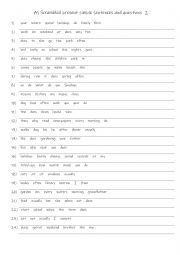
|
A1 Scrambled present simple sentences and questions 2
Practising scrambled present simple sentences and questions helps students understand correct word order, including subject-verb agreement and the use of auxiliaries in negatives and questions. It enhances their grammatical accuracy, boosts critical thinking as they rearrange words meaningfully, and improves their ability to form sentences quickly ...
Level: elementary
Age: 6-100
Type:
Downloads: 128
|
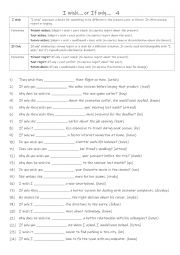
|
B1-B2 I wish�. or If only�. 4
First, students need to familiarise themselves with the 2 patterns and their use. Then they read the sentences to work out which tense is needed to complete the gap-fill using the infinitive in (). Each pattern is used 12 times! Answers on page 2
Level: intermediate
Age: 10-100
Type:
Downloads: 115
|
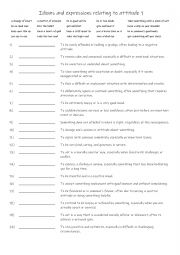
|
B1+-C1 Idioms and expressions relating to attitude 1
First, students need to familiarise themselves with the 20 idioms and expressions and their meanings. Then they read the definitions to see which one is being described and write that word in the space provided Answers on page 2.
Level: intermediate
Age: 12-100
Type:
Downloads: 111
|
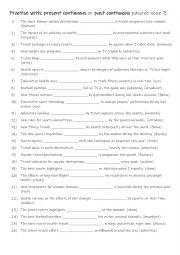
|
A2-B1 Practise with present continuous or past continuous passive voice 3
These tenses enhance precision and fluency when talking about the future. First, students need to familiarise themselves with the 2 tenses and their use. Then they read the sentences to work out which one is needed to complete the gap-fill. Each adverb is used 13 times! Answers on page 2
Level: elementary
Age: 10-100
Type:
Downloads: 119
|
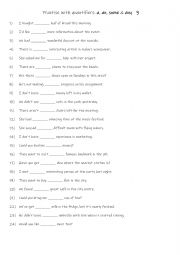
|
A1-A2 Practise with quantifiers a , an , some & any 3
Mastering these basics is essential for both everyday communication and more advanced language use, as these quantifiers are frequently used in real-life scenarios like offering, requesting, or describing items. First, students need to familiarise themselves with 4 quantifiers and check their meaning and use. Then they read the sentences to see whi...
Level: elementary
Age: 7-100
Type:
Downloads: 107
|
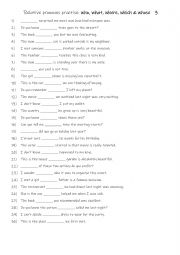
|
A1+-A2 Relative pronouns practise who, what, where, which & whose 3
Mastery of these pronouns also builds grammatical accuracy, making students more confident in formal and informal contexts. First, students need to familiarise themselves with the pronouns and their use. Then they read the sentences to see which one is needed to complete the sentence. Answers on page 2.
Level: elementary
Age: 9-100
Type:
Downloads: 115
|
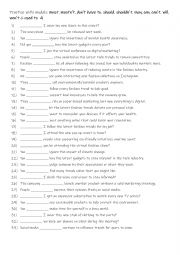
|
A1+-A2 Practise with modals must, mustn�t, don�t have to, should, shouldn�t, may, can, can�t, will, won�t & used to 4
First, students need to familiarise themselves with the modals and their use. Then they read the sentences to see which one is needed to complete the sentence. Answers on page 2.
Level: elementary
Age: 8-100
Type:
Downloads: 123
|
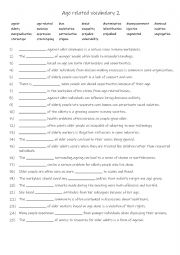
|
B1+-C1 Age related vocabulary 2
First, students need to familiarise themselves with the 25 words and their meanings Then they read the definitions to see which one is being described and write that word in the space provided. Answers on page 2.
Level: intermediate
Age: 11-100
Type:
Downloads: 136
|
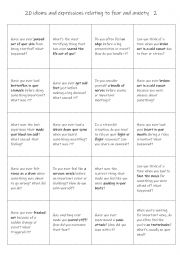
|
B1+-C1 20 idioms and expressions relating to fear and anxiety 2
First, students need to familiarise themselves with the 20 idioms and expressions and their meanings. Then they read the definitions to see which one is being described and write that word in the space provided Answers on page 2.
Level: intermediate
Age: 12-100
Type:
Downloads: 107
|
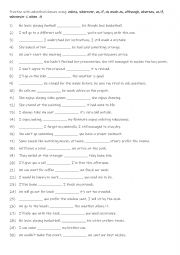
|
A2+-B1 Adverbial clauses 4
Learning adverbial clauses using words like unless, wherever, as, if, as much as, although, whereas, as if, whenever and when helps students express complex relationships between ideas, such as condition, time, contrast, and manner. First, students need to familiarise themselves with the 10 adverbial clauses and their use. Then they read the senten...
Level: intermediate
Age: 10-100
Type:
Downloads: 118
|
|
|
|
|












